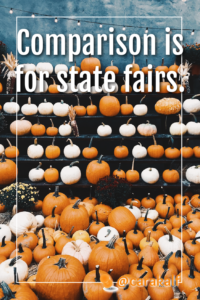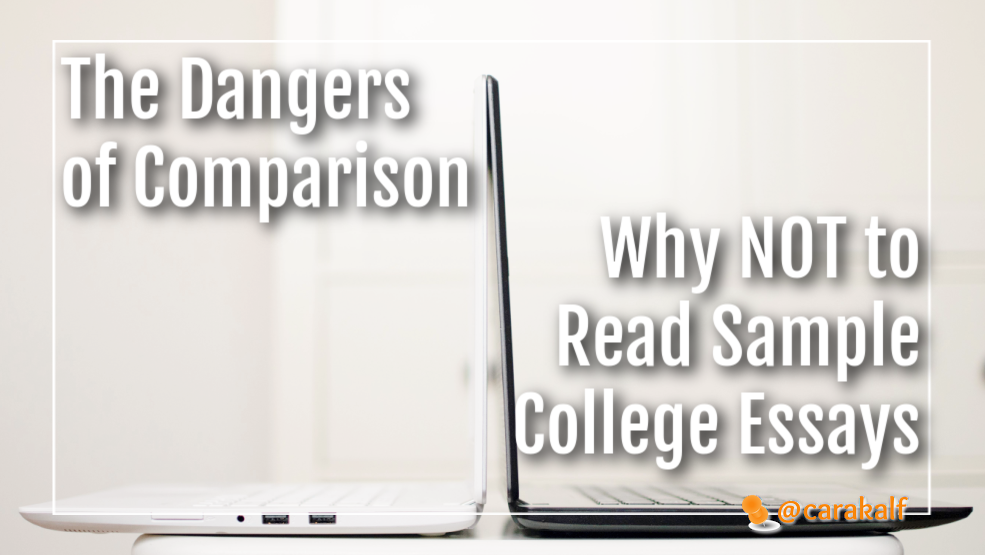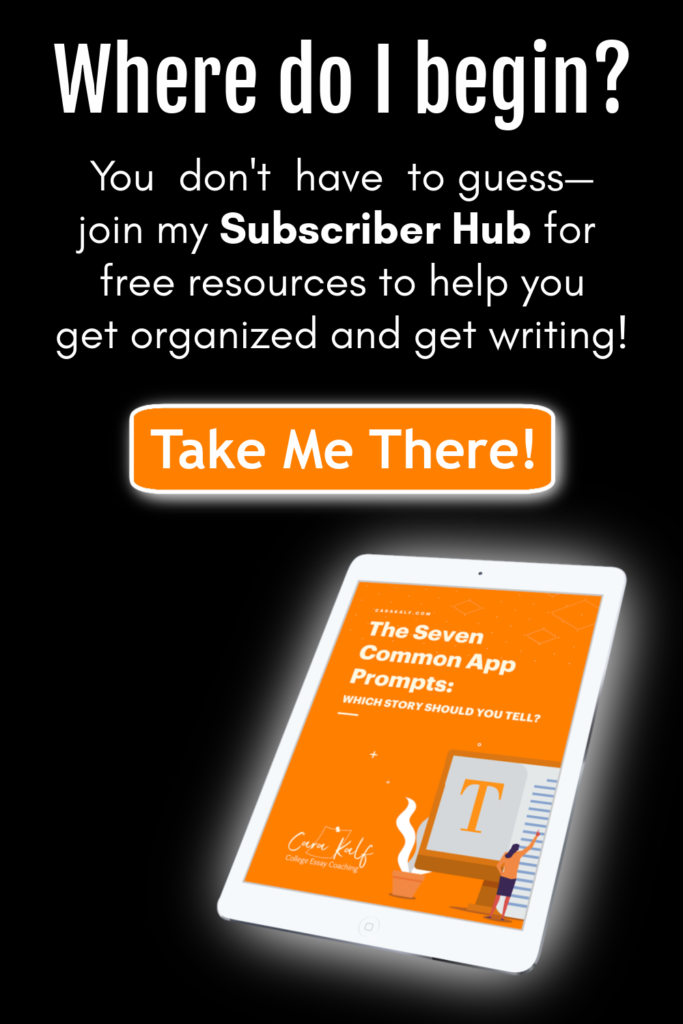I’m going to take an unpopular position here: I think you should not read other students’ college essays. Not ones published in books, not ones available online, and potentially not even ones by people you know.
You’re already stressed about how you sound and whether you’re clever or interesting enough. The last thing you need right now is to binge on other people’s genius. This is like starting a diet by scrolling Instagram. Forget it.
Unless you’re really sure about what you’re going to write or have written, and confident in how you’ll do or have done it, reading others’ work is going to make you second-guess yourself. Just a few weeks ago, I had to talk a student out of changes he made to an already strong piece after reading his friends’ work. It’s not that his friends’ essays were bad models (I never read their pieces, so I couldn’t say)—it’s that him trying to be his friends was not a good fit. Being yourself is a better choice.

Here’s the truth: Every “model” essay isn’t loved by every reader—it can’t be. So don’t assume that if something is published, it’s fantastic or faultless. Even something that “got the writer into every Ivy” didn’t actually do that—the complete application package got them in. So … grain of salt.
Let’s look at all of the specific things that can go wrong if you read too many “model” essays.
First, IDEAS. I’m just going to come out and say it: I don’t think you should shoot your brother to ensure you have something to write about on your college essay. [Yes, I realize that wasn’t why the writer did it. It was a well-written essay—but the concept of confessing in the form of a college essay felt gimmicky to me, and what on earth good does it do as a model? “If you’ve got any skeletons in your closet, now might be a great time to bring them up!”] That site also features “model” essays about traveling to 29 different countries and about spending two full years as an exchange student. I’m pretty confident that students who have had those kinds of opportunities realize those are good topics. For everyone else, those kinds of models make them feel they have nothing interesting to say, which is unfair and untrue.
Unless you are a passionate writer, please don’t try to write something creative and “different” because you’re worried that what you actually have to say is “too cliche.” Writing something vaguely figurative and sort-of philosophical is a huge risk. You might end up not saying much about yourself, and the philosophy might come across as overly general. The “Costco essay” became a viral hit. But if you are inspired by a piece that quirky, you risk doing something too similar. (Hmm, she liked Costco. Where do I like to shop?) (And again, many coaches—me included—found that piece just a little too self-assured. We were outvoted by the people who mattered—the admissions people—but it just goes to show you can’t please everyone, and admissions people change.)
Second, ORGANIZATION. Naturally, the essays that tend to be published are by excellent writers, and often take interesting risks in structure. That makes them less useful to you as a model because an unusual organization can be difficult to pull off if you’re not a strong, confident writer. (And if you model your piece after an unusual piece that you’ve read, it’s no longer creative and unusual.) The good news is you don’t need an unusual or unexpected organization to carry a great story.
Third, VOICE. You’ve heard it from me and from everyone else: The schools want to hear YOU. They want to feel like they’re getting to know you, and one of the ways you convey that impression is in writing ‘like yourself.’ A good writer has a strong voice, and the more you read college essay examples, the more you absorb and are influenced by the voices of others (much like some people pick up accents from conversation partners). When you’re learning to be a better writer, absorbing influence from strong models is a good thing. But when you’re trying to write your own best voice, you need to not be overwhelmed by other voices.
Above all, I find that students read college essay examples in the hopes of finding the magic key or cracking the secret code. One of the reasons I love what I do is that I believe when you’re writing college essays, you’re building your skills as a writer. If you study for your SATs and learn that we overuse “where” when we really mean “when” or “in which,” then you’ve learned something you can take with you. If you study for your SATs and learn that you can knock out wrong answers by learning which kinds of fake answers the test usually gives … well, that’s interesting and will serve you until you’ve finished the SATs. In the same way, I like to see students write great essays, not second-guess what admissions counselors might like. That means writing their own story, the best way they can, and not trying to match their subject, organization, voice, tone, or style to something that has “worked” for someone else. Your job is to tell your story in a way you’re proud of—that’s clear, coherent, and sounds like you are at your best.
What if you don’t want to get caught in the above traps—but you have no idea what a personal essay should sound like? You need one solid example, not written for an application but accomplishing all of the goals you should be holding for your essay. I’ve broken one down in Your Best 650: The Workbook, available with all one-on-one essay coaching packages. For more information, schedule a consultation.
“NHS is a club where we …”
“Engineering Basics was a class where we …”
Yes, the club and the class both met in physical locations, but these usages aren’t
technically acceptable. The correct phrase would be “in which.” In both cases, though, it
would be preferable to just rephrase the sentence: “In Engineering Basics, we …”
(Photo by Jeroen den Otter on Unsplash)


